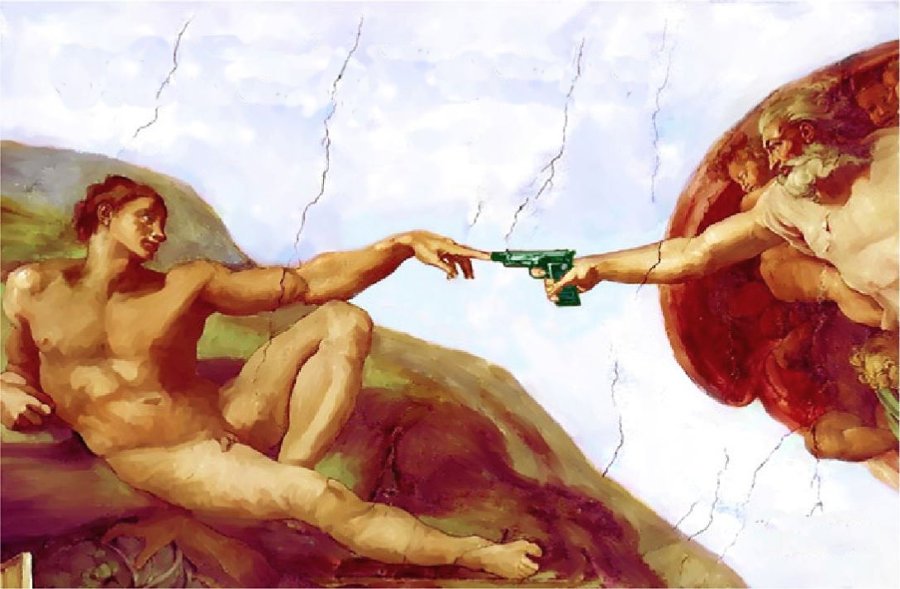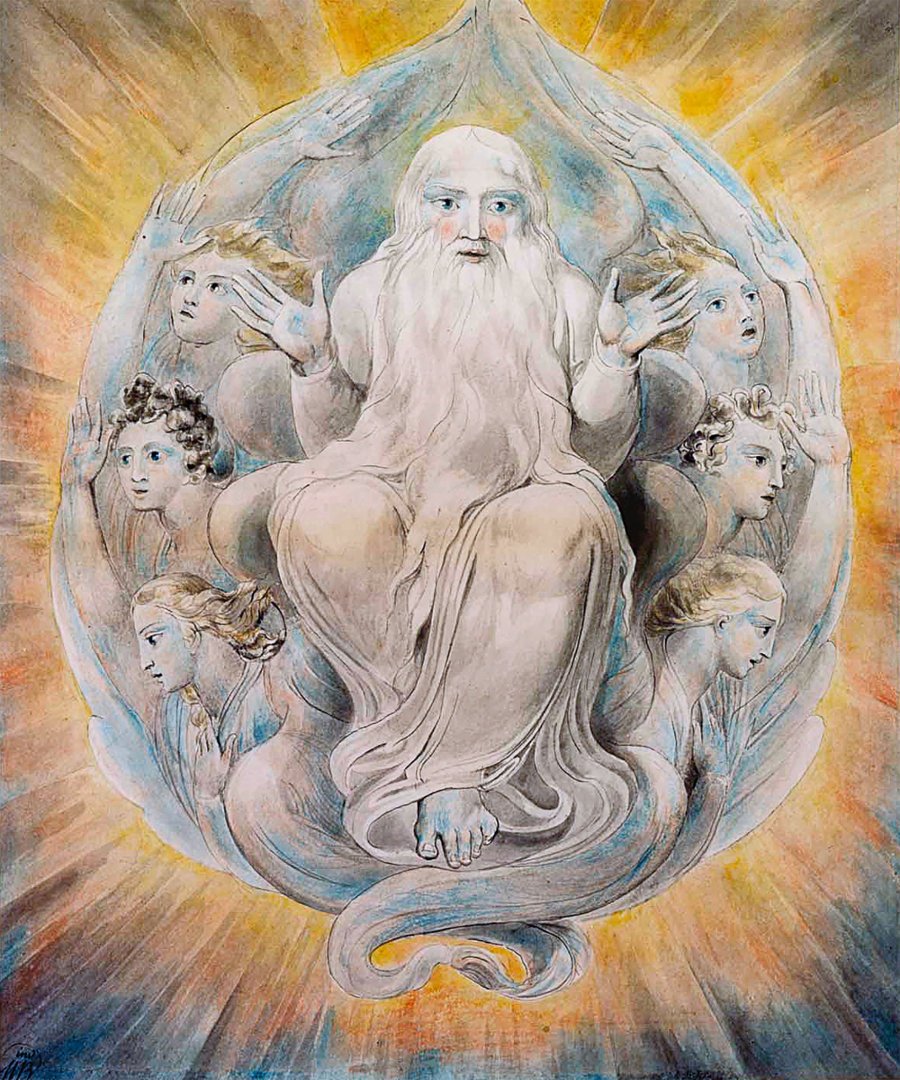We are temporal beings. And we are temporary beings to. We understand our lives and surroundings through a sequential experience of moments, during which we witness each previous moment causing the next. This way we see all things, including our own lives and that of the universe, encapsulated by a beginning and an end.

source: God Wants You Dead - scribd.com
We're bound to the concept of time, we're slaves to it and the rest of reality. The fact that we understand everything in this fourth dimension as a chain of causes and effects, has created our greatest mysteries, one of the best being the quest for the first cause. And on a smaller, biological level there's the question what happens after death. I'm not going to try to answer these questions, at least not today. It's 42, everybody knows that. But the most popular first cause is still God.
Proponents of the Bible, Christians of all denominations and doctrines, often use this cosmological argument as a reason for the need for the existence of God; the universe must have a beginning, nothing can come from nothing, so there has to be something outside space-time, something transcendent, that caused the universe to spring into existence, ergo God. This omnipotent, omniscient and omnibenevolent creature, if it indeed was able to create all we know, has to wonder about it's own origin also, which makes this argument a circular argument fallacy. If you don't want to apply the cause and effect principle to God Himself, you cannot use it as an argument at all. God, in other words, cannot be eternal or "outside" of time if you want to use God as an explanation for something purely temporal as the beginning of the universe.
But I'm losing thread here, sorry. The title from this post is not of my own creation:"God Wants You Dead is the title of a brilliant book by Sean Hastings and Paul Rosenberg. The picture in this posts heading is from the cover. The authors made the title and cover very provocative for good reasons:
Holding this book in your hands, do you find yourself worried that people around you might see what you are reading?
If so, why should that be? Reading a book is in no way an endorsement of the contents of that book. Reading is a quest for knowledge. There should be nothing wrong with wanting to learn why other people think differently than you, or differently than the group in which you find yourself. You don’t have to already agree with everything you read – in fact it would be boring if you did.
source: God Wants You Dead
Right from the start the authors make clear that the book is not only about belief in God or the Bible, but essentially tries to answer the question why people believe the things they do. Why do we seem to want to believe in a higher power, if not the God from the Bible, then maybe some political party or ideological leader. The book is about taking control over your own mind and ideas. But I want to focus on the title for now and talk about it's implications.
It's always a good idea to hear the other side of any discussion, so if you're interested here's a lecture from an online Bible fellowship on the very topic we discuss here, namely that God really wants us all dead:
2013 Seminar Part 6 - God Wants You Dead
Eternal life is the ultimate reward God grants those who live by his Word, but, as the title says, you have to die first. Eternal life therefore is to be granted by God only... So would that mean that if we could conquer death, if we could somehow "kill the aging-gene", that Christians would refuse eternal life on earth to gain passage to eternal life in Paradise? Don't get me wrong: I personally don't think it would be beneficial to our species if we would live forever, but that's for very different reasons. Christians have been known to refuse vaccines or other forms of medical treatment, even for their kids, because their God knows best when it's their time to leave this world, not those pesky dokters.
Some people seem to think that medical science can be "too good." They feel that current research directed at extending the human life span is unnatural.They will often say that it is not good to be "playing God."
So we wonder, at just what point should the faithful believe that trying to stay alive messes up God’s plan?
An even more important question this book will address is why people believe the things they do. Why do some people believe that taking penicillin will thwart God’s will, while others would gladly accept an artificial heart? Why do some religions require a strictly regulated healthy diet, while others mandate the drinking of poisoned fruit punch?
source: God Wants You Dead
The fact that we know that one day we'll die, gives our lives a sense of urgency. It's a good thing we cannot eternally say "ah well, I'll do it tomorrow, all the time in the world..." We would become complacent, we would stop having kids; evolution, in the biological sense as we know it at least, would stop. And what's so attractive about eternal bliss anyway? How happy would we be if happiness was all we knew? What is happiness without grief or sadness?
Ultimately it is a good thing then that God wants you with Him only after you leave this world. And when you die He'll judge you first and decide if you indeed deserve to live forever, or if you will just die, or spend eternity in Hell, depending on your particular variation of Christianity. While this book is supposed to be somewhat lighthearted, some aspects of religion are truly troublesome in my opinion, the refusal of modern medical treatment being one of them and willingly giving up your free will, to the extent we have that, to the service of some unproven entity. It's so difficult to think about, but isn't this a large part of the reasons suicide-bombers do what they do? Their religion might not have caused the will to do harm, but it surely makes it a lot easier to sacrifice yourself and countless others if you truly believe you're doing your Lord's will.

"God Blessing the Seventh Day" - a pen and watercolor painting by William Blake, c.1805
source: Wikimedia Commons
If you are a religious person, please don't take this as an intent to insult or hurt your feelings; I genuinely am trying to understand why people believe what they do and how this shapes our shared reality. So I would welcome your opinions on these matters, I would love to read them actually. And if you're at all interested, yes you non-religious people to, in learning about keeping your mind flexible and open to new ideas, please read this lovely book. You can read it for free here: God Wants You Dead.
As always I am so grateful for your visit here on my blog! Thank you, keep cool and keep steeming my friends :-)

Recent articles you might be interested in:
| Latest article >>>>>>>>>>> | Polarization Bubble |
|---|---|
| It's A MAD World | STEEM Is Still Doing Great! |
| Moral Dilemma | Starting On Steemit: My 4 Month 1 Year Anniversary |
| The Last Straw | Presence |

Thanks for stopping by and reading. If you really liked this content, if you disagree (or if you do agree), please leave a comment. Of course, upvotes, follows, resteems are all greatly appreciated, but nothing brings me and you more growth than sharing our ideas. It's what Steemit is made for!


Just for Full Disclosure, I'm invested in these crypto-currencies:
Bitcoin | Litecoin | EOS | OmiseGo | FunFair | KIN | Pillar | DENT | Polymath | XDCE | 0x | Decred | Ethereum | Carmel | XYO
